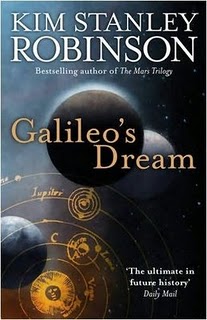The commentary I’ve encountered on this year’s Clarke Award generally agrees on two things: that it’s a five-horse race, and that Chris Wooding is the author who’s written the also-ran. Having read all the shortlisted novels, I must concur with that view. Retribution Falls is a good book on its own terms — a superior sf adventure story — but it seems lacking in the context of this shortlist. It just doesn’t have the extra depth that the others, in their different ways, all have. For that reason, Wooding’s book is first out of the running for me.
The favourite to win the Clarke this year is The City & the City. This is a fascinating, innovative novel (the first, as far as I’m aware, to engage so explicity with the crtical taxonomy of fantasy that has emerged in the last fifteeen years), possibly China Miéville’s best-written to date. I like it very much… but I don’t think it should win. The reason I don’t think it should win is that the Clarke is an award for science fiction, and The City & the City doesn’t make sense if read as sf — one is forced into an unsatisfactory psychological interpretation. However, the novel does make sense — and is much more interesting — if read as fantasy (see my review for more on this); I’d be happy for it to win any fantasy awards for which it may be nominated, but I don’t see it as a good fit for the Clarke.
I intended to review the entire shortlist, but, in the end, I’m one title down. The reason I haven’t written previously about Gwyneth Jones‘s Spirit is that I really struggled to get to grips with it. I grasped the basics of the story, but there’s so much else about which I’m not sure that I can’t see my way to giving the novel a proper review. Why I experienced this difficulty, I don’t know; maybe it was because of all the associated books I hadn’t read (Spirit is a re-interpretation of The Count of Monte Cristo, and is connected to both Jones’s earlier Aleutian Trilogy and her Bold as Love sequence), maybe something else. Whatever, though I’m not able to comment on Spirit in detail, I do gain an impression of a significant work.
Galileo’s Dream by Kim Stanley Robinson combines fictional historical biography with far-future sf, to what I found was mixed effect. It is an excellent work at times, but tries one’s patience at others, and its two aspects don’t integrate as well as they might. But there’s a lot about the book that I know I missed (I didn’t pick up on all the sbutext, for example), so I’m quite willing to accept that Galileo’s Dream is a stronger book than I found it to be, and hence a strong contender for the Clarke.
There’s also a lot about Adam Roberts‘s Yellow Blue Tibia that I know I missed — but, all the same, I thoroughly loved it. Of all the shortlisted title, this is the one I enjoyed the most, both for its humour and for what it does as a work of imaginative literature. I can’t judge in full how successful it is, because for that I’d need more knowledge of its historical setting, and the science fiction with which it engages — but it’s worthy of winning the Clarke as far as I’m concerned.
Finally, Marcel Theroux‘s excellent Far North, which is my other pick of the shortlist. A post-disaster novel which is less about the effect of change on the world than itseffect on humanity, this is a quiet book that makes its point subtly and with force. It works superbly as an aesthetic whole, to a greater extent than perhaps any other novel on the shortlist. A win for Far North would be thoroughly deserved.
So, I’d most like to see Roberts or Theroux be awarded the Clarke this year, but, really, it’s an open field, and I would not like to predict who will win. The winner will be announced this Wednesday, and I look forward to finding out whom it will be.

Recent Comments